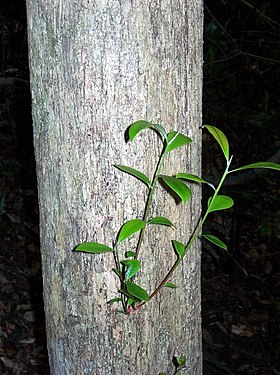Syzygium australe
| Habit | tree
| |
|---|---|---|
| Height: | ⇕ | 25 ft"ft" can not be assigned to a declared number type with value 25. |
| Width: | ⇔ | 20 ft"ft" can not be assigned to a declared number type with value 20. |
| Lifespan: | ⌛ | perennial |
| Bloom: | ❀ | early summer, mid summer, late summer |
| Exposure: | ☼ | sun |
|---|---|---|
| Features: | ✓ | flowers, edible, fruit |
| USDA Zones: | 9 to 12 | |
| Flower features: | ❀ | white |
|
Syzygium > |
australe > |
Syzygium australe, commonly called Brush Cherry or Scrub Cherry, is a rainforest tree native to eastern Australia. It can attain a height of up to 35 m with a diameter of 60 cm. The leaves are opposite, simple, lanceolate from 4-8 cm long. Flowers are white and in clusters. The dark pink to red fruits are edible. [1]
Brush Cherry is commonly cultivated in gardens in eastern Australia, mostly as shorter, shrub-like cultivars. These are especially popular as hedges. The pleasantly sour fruit are also eaten fresh or cooked. The fruit can be used to make jams and jellies.
Commonly confused with Magenta Cherry and the Blue Lilly Pilly. However, the Brush Cherry has a paler trunk.
Read about Syzygium australe in the Standard Cyclopedia of Horticulture
|
|---|
|
Eugenia myrtifolia, Sims (E. australis, Wendl. Jambosa myrtifolia, Ndz.). Australian Brush Cherry. Tree, attaining 80 ft., glabrous: Lvs. oval or oblong-lanceolate, mostly acute, 1½-3 in. long: fls. white: fr. red, ovoid, nearly 1 in. long, with an acid taste. Austral.—Hardy in the S. Much used in Calif. as an ornamental tree and for clipped hedges. The foliage is dense and glossy, green when mature, tinged with wine-red on the gracefully spreading young shoots. Frs. sometimes used in jelly-making. CH
|
Cultivation
Propagation
Pests and diseases
Varieties
Gallery
References
- ↑ Floyd, A.G., Rainforest Trees of Mainland South-eastern Australia, Inkata Press 1989, ISBN 0-909605-57-2
External links
- w:Syzygium australe. Some of the material on this page may be from Wikipedia, under the Creative Commons license.
- Syzygium australe QR Code (Size 50, 100, 200, 500)



